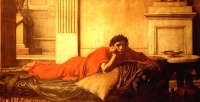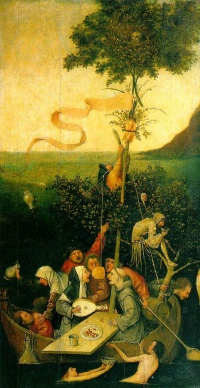Madness
From The Art and Popular Culture Encyclopedia

The Remorse of the Emperor Nero after the Murder of his Mother (1878) by John William Waterhouse
|
"There is no great genius without some touch of madness" --Seneca, De Tranquillitate Animi |
|
Related e |
|
Featured: |
Madness is the state of being mad (insane) or angry.
[edit]
Etymology
Middle English medd, madd, from Old English gemǣd (“enraged”), from gemād (“silly, mad”), from Proto-Germanic *maidaz (compare Old High German gimeit (“foolish, crazy”), Gothic gamaiþs (gamaiþs, “crippled”)), past participle of *maidijaną (“to cripple, injure”), from Proto-Indo-European *mei (“to change”) (compare Old Irish máel (“bald, dull”), Old Lithuanian ap-maitinti (“to wound”), Sanskrit मेथति (méthati, “he hurts, comes to blows”)).
[edit]
See also
- Amour fou
- Antisocial personality disorder
- Illness
- Insanity
- Irrationality
- Love is madness
- Madness and Civilization
- Mad emperors of Rome
- Madman
- Madwoman
- Mental disorder
- Obsession
- Psychopathy
- Stone of madness
- Unreason
[edit]
Music
- Madness (band), a British ska/pop band
- "Madness", a song by Prince Buster from I Feel the Spirit, also covered by Madness
Unless indicated otherwise, the text in this article is either based on Wikipedia article "Madness" or another language Wikipedia page thereof used under the terms of the GNU Free Documentation License; or on research by Jahsonic and friends. See Art and Popular Culture's copyright notice.
_is_a_1822_oil_painting_by_Théodore_Géricault.jpg)


